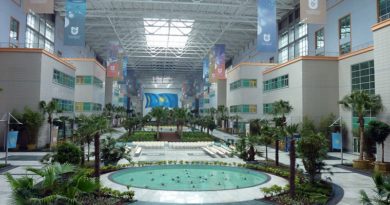Bamako Convention COP3 kicks-off in Congo
The third Conference of the Parties (COP-3) to the Bamako Convention on the Ban of the Import into Africa and the Control of Transboundary Movement and Management of Hazardous Wastes within Africa kicked off on Wednesday 12 February 2020 in Brazzaville, Republic of the Congo.
The three-day conference runs 12 February to 14 February 2020 in Brazzaville, Republic of the Congo under the theme: From from Decisions to Action: Working for Africa with a Safe Chemicals and Waste Future.
Hazardous waste in Africa poses substantial threats to human health and the environment. African nations have long dealt with incidents involving hazardous waste dumping through importation or outright dumping. Unfortunate environmental disasters and the current piles of e-waste threatening the health of African communities makes the continent particularly disproportionally affected by the dumping of harmful chemical materials.
“The theme for this COP is a call to move forward and make a reality those aspirations which Member States have shared over the last two conferences,” said Juliette Biao Koudenoukpo, Director and Regional Representative for the UN Environment Programme’s (UNEP) Africa Office. “This requires renewed political commitment and the development of strategies, policies and institutional frameworks for the effective implementation of the Convention.”
COP-3 will provide a platform to discuss ways and means of ensuring that the continent moves from making decisions to action to rid itself of hazardous wastes and contribute to the achievement of a pollution-free planet. The Conference is also expected to discuss a roadmap for the transfer of the Secretariat of the Convention to the Republic of Mali.
In August 2006, the cargo ship Probo Koala discharged 500 tons of toxic waste in Abidjan killing 17 people and poisoning thousands of others.
In 1988 thousands of barrels of hazardous waste disguised as building materials were discovered in the village of Koko, Nigeria. Several barrels were unsealed causing leakage and serious health effects to the residents.
Established in 1991 by Africa nations and coming to force in 1998, the Bamako Convention is a response to Article 11 of the Basel Convention, which encourages parties to enter into bilateral, multilateral and regional agreements on hazardous waste to help achieve the objectives of the Convention. The Bamako Convention prohibits the import into Africa and the dumping or incineration into ocean and inland water of hazardous wastes, including radioactive waste; the Convention promotes the minimization and control of trans-boundary movements of hazardous waste within the African continent. The Convention also aims to improve and ensure ecologically rational management and handling of hazardous waste within Africa, as well as cooperation between African nations.
“Waste management is today one of the biggest challenges to our planet and a major concern for our countries because of its health and environmental consequences,” said Joseph Seka Seka, Minister of the Environment and Sustainable Development for Cote D’Ivoire and the outgoing President of Bamako Convention. “We have a collective responsibility to protect and save our environment and our common planet in the face of threats to the health and well-being of our populations, and to work in favour of an Africa safe from the harmful effects of chemicals and waste.”
Parties are expected to review and adopt the new proposed list of substances which have been banned, cancelled or refused registration by government regulatory action, or voluntarily withdrawn from registration in the country of manufacture, for human health or environmental reason.




